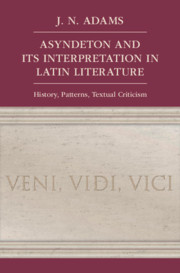Book contents
- Asyndeton and its Interpretation in Latin Literature
- Frontispiece
- Asyndeton and its Interpretation in Latin Literature
- Copyright page
- Contents
- Preface
- Acknowledgements
- Abbreviations
- Part 1 Introduction
- Chapter I Asyndetic and Syndetic Coordination: Definitions and Types
- Chapter II ‘Asyndeta’ That May Not Be Asyndeta: Roles of Adjectives; Appositional Compounds; and ‘Asyndetic Hendiadys’
- Chapter III Asyndeton Versus Coordination, an Introduction
- Chapter IV Lists of Two Types
- Chapter V Supposed ‘Effects’ of Asyndeton
- Part 2 ‘Grammatical’ Types
- Part 3 Semantic Types
- Part 4 Structures
- Part 5 Genres And Texts
- Part 6 Conclusions
- Bibliography
- Subject Index
- Index Mainly of Selected Pairs and Longer Sequences
- Selective Index Locorum
Chapter IV - Lists of Two Types
from Part 1 - Introduction
Published online by Cambridge University Press: 13 May 2021
- Asyndeton and its Interpretation in Latin Literature
- Frontispiece
- Asyndeton and its Interpretation in Latin Literature
- Copyright page
- Contents
- Preface
- Acknowledgements
- Abbreviations
- Part 1 Introduction
- Chapter I Asyndetic and Syndetic Coordination: Definitions and Types
- Chapter II ‘Asyndeta’ That May Not Be Asyndeta: Roles of Adjectives; Appositional Compounds; and ‘Asyndetic Hendiadys’
- Chapter III Asyndeton Versus Coordination, an Introduction
- Chapter IV Lists of Two Types
- Chapter V Supposed ‘Effects’ of Asyndeton
- Part 2 ‘Grammatical’ Types
- Part 3 Semantic Types
- Part 4 Structures
- Part 5 Genres And Texts
- Part 6 Conclusions
- Bibliography
- Subject Index
- Index Mainly of Selected Pairs and Longer Sequences
- Selective Index Locorum
Summary
The term ‘list’ is not particularly helpful in characterising asyndeton and its types, though it (or an equivalent) does have a place in the literature. One ‘special type’ of asyndeton, according to Hofmann and Szantyr (1965: 830), is ‘asyndeton enumerativum’. But virtually any asyndetic sequence, particularly of names, nouns or adjectives, may be seen as a list. A series of adjectives describing the physical features or character of a person is a list of personal characteristics, the itinerary of a traveller is a list of places, the names of persons appointed to some organisation for a fixed period make up a list of officials or officers, and so on. When is an asyndetic sequence not a list? A pair or series of verbs describing actions in a temporal sequence (they stopped, turned, fled) would not be well described as a list. Pairs of terms with certain semantic relationships, such as opposites of various sorts (left/right; up/down; good/bad, go/return), are not list-like. A pair of verbs consisting of a simplex followed by its compound is not a list. It may be more helpful to identify types of lists. One of these, of some importance in relation to asyndeton, I will call ‘open-ended’ or composed of ‘illustrations’. I start however with a different type, which is perhaps more familiar to anyone using the term ‘list’. This type expresses a totality or finite set.
- Type
- Chapter
- Information
- Asyndeton and its Interpretation in Latin LiteratureHistory, Patterns, Textual Criticism, pp. 66 - 75Publisher: Cambridge University PressPrint publication year: 2021



